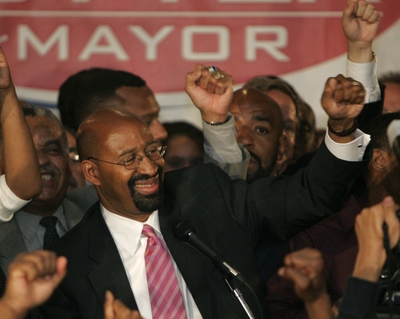As first reported by Technically Philly, Mayor Nutter signed yesterday an Executive Order pledging greater transparency through data releases.
Executive Orders are good at making clear top-level goals, but the hard work is left to be implemented: namely entrenching departmental workflows to ensure its objectives.
Read the full text of the Executive Order here, but first, here are 10 items that caught Technically Philly’s attention.
(Also, NBC 10 coverage here, Metro coverage here and the official press release here.)
- “City data sets should be published and made available via an Open Data Portal” — Considering OpenDataPhilly.org is still looking for a permanent home, it is a natural candidate to fill that role, though the platform’s independence to a private steward — GIS shop Azavea — has likely helped it remain agile. Will the administration be willing to focus on workflow and data accuracy and give up dissemination? Should it? Most peer cities have data catalogs owned by the local municipal government, not private firms, but it’s not necessarily clear that’s a bad thing.
- This will “require the dedication of a new position, of Chief Data Officer” — Dedicated internal staff resources are good, but for an effort focused on transparency, there are no shortage of examples of government coming up short when checking in on itself. The City Controller’s office has some independence and currently-seated Alan Butkovitz makes lots of noise, though it has been called politically motivated and can change dramatically with a given election. It should also be noted that the nearby City of Baltimore has gone through turmoil surrounding its similarly named Chief Digital Officer.
- The Mayor and the Chief Innovation Officer (CIO) will establish an Open Data Working Group — That sounds like a slice of OpenAccessPhilly: will it live on?
- Within 90 days the administration pledges to hire a Chief Data Officer — Though the deadline may seem arbitrary and the position’s role could be challenged, the administration deserves credit for giving a firm deadline: Wednesday, July 25, 2012 by our count.
- Within 120 days from the Effective Date of this Order, the Mayor shall appoint a Data Governance Advisory Board — How serious will the board be taken and how much independence will they have? That’s to be determined. Oh, and the deadline: Friday, August 24, 2012, by our count.
- Within six months, the board will publish a city-wide Open Government Plan — Top-level strategy is valuable, though pragmatism and influence will be key in creating recommendations bold enough to warrant excitement but practical enough to be implemented in a city government with more than 22,000 employees. Both of these efforts call for public comment, which deserves recognition. Deadline: October 2012.
- Within 90 days of the Chief Data Officer’s hiring, he or she will launch an Open Data Portal — The Executive Order specifically references the ability to use an existing tool. The city should likely have its own repository of its data, but there is value in an outside organization pushing on these efforts from afar with some independence.
- Within 120 days of the Effective Date of this Order, the City Solicitor has to review these efforts — That’s the city’s lawyer and this is an absolutely necessary step (and serious hurdle for bold work). The detail should be applauded.
- Each department must create a catalog of its open information — This is a clear call to action to department heads from the Mayor and, if this order has teeth, will be among its first, most tangible successes.
- The data must be in an ‘open format’ — What specifically that means isn’t necessarily clear but it’s reference to flexibility allows for a strong, well-informed board to push for scalable solutions like API formats (or that platform’s successor).
Join the conversation!
Find news, events, jobs and people who share your interests on Technical.ly's open community Slack





